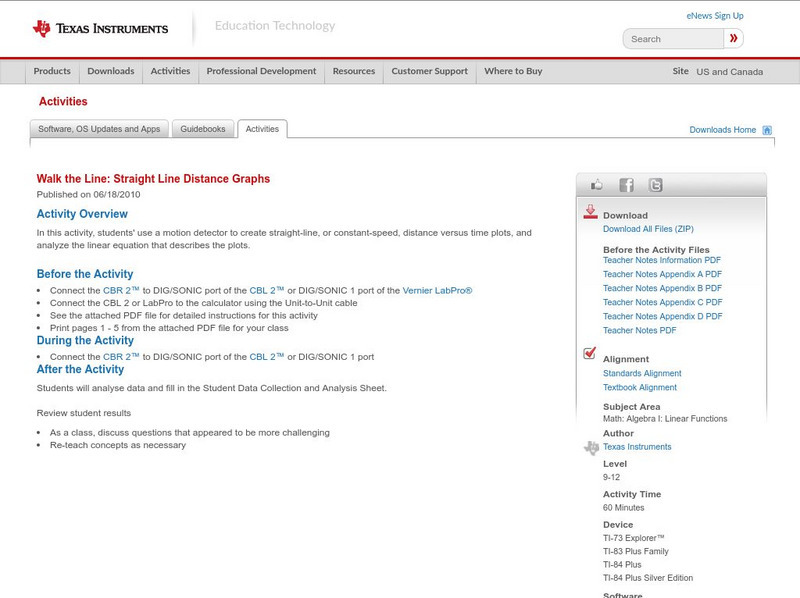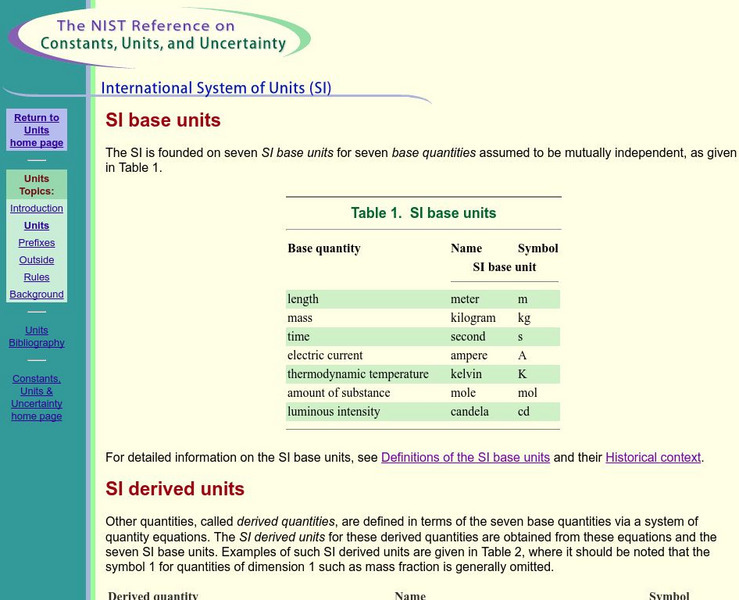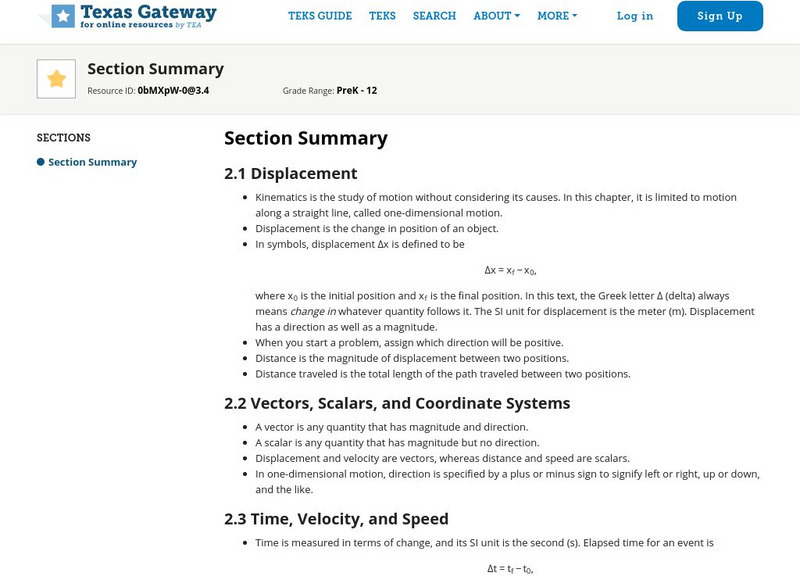Hi, what do you want to do?
Physics Aviary
Physics Aviary: Circular Acceleration
This program gives students a visual representation of why an object moving in a circle at constant speed is accelerating. This program will guide students through a method of calculating the circular acceleration based on the change in...
Physics Classroom
The Physics Classroom: Circular & Satellite Motion: Uniform Circular Motion
Manipulate variables while exploring principles and relationships related to moving in a circle at a constant speed. Students change the radius of the circle, the speed of the object, and the mass of the object and investigate the effect...
Texas Instruments
Texas Instruments: Walk the Line: Straight Line Distance Graphs
In this activity, students' use a motion detector to create straight-line, or constant-speed, distance versus time plots, and analyze the linear equation that describes the plots.
Physics Classroom
The Physics Classroom: Vectors and Projectiles: The Plane and the Package
Consider a plane moving with a constant speed at an elevated height above the Earth's surface. In the course of its flight, the plane drops a package from its luggage compartment. This animation depicts such a situation. The path of the...
Physics Classroom
The Physics Classroom: Vectors and Projectiles: The Truck and the Ball
Imagine a pickup truck moving with a constant speed along a city street. In the course of its motion, a ball is projected straight upwards by a launcher located in the bed of the truck (with no air resistance). This animation depicts the...
National Institute of Standards and Technology (NIST)
International System of Units: Si Base Units
This is the definitive source for information on SI base units, derived units, squares, cubes, luminosity, field strength and flux density.
Science Education Resource Center at Carleton College
Serc: Analyzing the Motion of a Marble Down a Ramp
This lab activity involves rolling a marble down a ramp where the students can investigate constant acceleration motion. The students then make a position vs. time graph and a velocity vs. time graph in order to investigate the change in...
Physics Aviary
Physics Aviary: Wavelength Lab
This lab is designed to have students investigate the relationship between the speed of a wave, the frequency of the wave and the wavelength of the wave. Students can vary wave speed and frequency. Each of these should be varied while...
Other
Helping With math.com: Ratios and Unit Rates
This site contains a lesson plan about ratios and unit rates as well as guided and independent practice for students to review the skills.
Physics Aviary
Physics Aviary: Practice Problems: Gas Partition Problem Level 2
Determine the temperature required to keep a piston in equilibrium. You must use information about the speed of the atoms in the left hand chamber to help you find the equilibrium pressure.
University of St. Andrews (UK)
University of St. Andrews: Special Relativity
A historical approach to special relativity, giving all the events and names in the history of discovery of special relativity. Many links to these individuals.
Department of Defense
Do Dea: Working With Parabolic Projectile Paths
Using the free-fall constants and gravity acceleration equations, we can determine many things about the position, velocity, and speed of a projectile. Here are a few examples and explanations. This is a great review for the AP Calculus...
TED Talks
Ted: Ted Ed: The Fundamentals of Space Time: Part 3
In this third and final lesson, CERN scientists Andrew Pontzen and Tom Whyntie explore what gravity means for space-time- or rather, what space-time means for gravity. [3:27]
CPALMS
Florida State University Cpalms: Florida Students: Tracking Distance Over Time
Using turtle migration to find the relationship when measuring distance over time.
Other
Nearpod: Distance Time Graphs
In this instructional activity on distance-time graphs, students will understand graphing by analyzing distance-time graphs.
McREL International
Mc Rel: Whelmer #9 Learning Activity: Nickel Karate
An easy to do activity that investigates the basic theories of inertia. The activity is in lesson plan format that meets NSES standards.
McREL International
Mc Rel: Whelmer #33 Learning Activity: Density Balloon
A simple activity that investigates the effect of heat on the volume of a gas. The activity is presented in lesson plan format that meets NSES standards.
TeachEngineering
Teach Engineering: Friction Force
Students use LEGO MINDSTORMS robotics to help conceptualize and understand the force of friction. Specifically, they observe how different surfaces in contact result in different frictional forces. A LEGO robot is constructed to pull a...
PBS
Pbs Learning Media: Why Doesn't the Moon Fall Down?
In this animated video segment adapted from NASA, astronomer Doris Daou explains how the forces of speed and gravity keep the moon in a constant orbit around Earth. [1:36]
Physics Classroom
The Physics Classroom: Acceleration
A GIF animation comparing the motion of three cars. A graphical depiction is given. Includes three thoughtful questions with answers in a pop-up menu.
Chem4kids
Chem4 Kids: Symbols in Chemical Equations
Chem4Kids! provides an overview of the symbols representing numerical values in chemical equations. Each symbol is defined and described.
Physics Classroom
The Physics Classroom: Vectors and Projectiles: Maximum Range
Students can imagine a cannonball launched at three different launch angles where the speed is held constant; only the angle is changed. The cannonballs do not encounter a significant amount of air resistance. How will the trajectories...
Texas Education Agency
Texas Gateway: Kinematics Section Summary
This is a summary of the main topics for AP Physics Chapter 2 Kinematics. These include Displacement; Vectors, Scalars, and Coordinate Systems; Time, Velocity, and Speed; Acceleration; Motion Equations for Constant Acceleration in One...
Varsity Tutors
Varsity Tutors: Hotmath: Algebra Review: Unit Rate
Find a quick, concise explanation of unit rates. An example is given and clearly explained.















